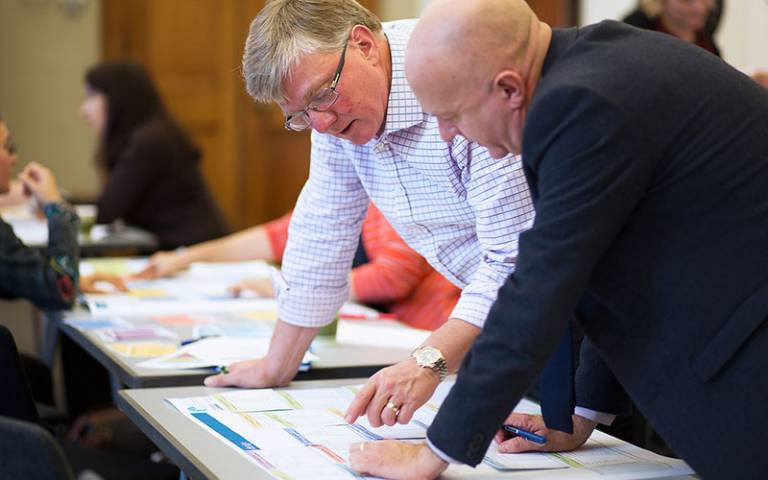Pioneering ABC Curriculum Design helps more than 200 modules across UCL
18 July 2018
UCL Digital Education awarded funding to develop unique storyboard approach with 12 European universities.

200 modules and six Continuing Professional Development (CPD) courses across UCL have benefited from ABC Curriculum Design, an engaging rapid-develop workshop pioneered by UCL Digital Education.
Clive Young and Nataša Perović developed the workshop to support UCL's transition to a blended campus, where technology supports authentic, creative and collaborative learning that enables a wide range of assessment approaches and augments the face-to-face contact our students value.
Now, UCL Digital Education has been awarded two year Erasmus+ funding to develop the ABC approach with 12 European universities.
The ABC curriculum design approach
Three years ago they devised the ABC workshops for modules and programmes.
ABC is a light touch team-based approach which helps academic teams co-create a visual storyboard for a module in just 90 minutes. The ABC builds on Viewpoints, a 2012 JISC project that used a card-based method for curriculum design and the learning types derived from the Conversational Framework model of Professor Diana Laurillard (UCL Institute of Education).
Over 75 workshops have been run at UCL with nearly 500 academics (and students) redesigning around 200 modules as well as a range of short courses (including Continuing Professional Development, CPD) and MOOCs.
The workshops aim to start the planning process for designing courses. Participants have commented: “you really focus, and so you can walk out and feel that you’ve really made a big leap forward in terms of planning and thinking”.
Thanks in part to a recent Higher Education Funding Council for England (HEFCE) project and our active participation in the League of European Research Universities (LERU) ABC’s successful approach has now been picked up by about 20 other universities in UK, and as many others across Europe and beyond.
- The unique approach is outlined in the case study Designing programmes and modules with ABC curriculum design
Working internationally
Based on this work UCL Digital Education has just been awarded two year Erasmus+ funding to develop the ABC approach with 12 European universities.
Six other universities are from LERU (Amsterdam, Helsinki, Leuven, Milan and the Sorbonne, with Oxford as an associate) and we are joined by six innovative universities from Belgium, Denmark, Croatia, Estonia, Ireland and Romania.
The project will look at how the learning designs can be built in Moodle and other learning environments.
The partnership will share practice in this area and further co-develop the ABC method as a downloadable toolkit that can be localised and used by any university in the sector.
A successful project: achievements to date
In addition to the 75 workshops run at UCL and various off-site activities, the team has:
- published the HEFCE-funded ABC LD toolkit 2018 on the Digital Education Blog, which includes several videos explaining the process;
- embedded the approach into Arena two: a professional development pathway for Lecturers and Teaching Fellows on probation. The pathway enables participants to apply to become a UCL Arena Fellow and Fellow of the Higher Education Academy;
- held their first conference in April 2018 with over 40 attendees, and four presentations from users who have created ‘localised’ adaptations.
- begun establishing a special interest group for UK universities.
Embedding the Connected Curriculum in programmes and modules
The ABC workshop specifically links to the Connected Curriculum and technical guides, digital benchmarks and online support.
The workshop generates high levels of engagement, creative informed dialogue and group reflection about cross-programme design among even time-poor academics.
It allows you to plan a whole programme to ensure relevant connections are made, but works particualrly well with the following Connected Curriculum Dimensions:
- Dimension two emphasises a through-line of research activities across a programme, enabling a steady buildup of skills and conceptual connections and an opportunity to reflect on the learning journey. The ABC gives staff an opportunity to design, or revaluate, a course at programme level to ensure these journeys and connections are being made.
- Dimension five focuses on new methods for student assessment, emphasising digital methods such as web pages, blogs, podcasts, videos and the like with the potential of reaching an external audience. Reviewing or designing a programme/module through ABC allows these specific assessments to be woven in at the design stage.
- Transferable skills, including digital capabilities, are also related to future professional work and students’ broader roles in society in Dimension six, which also benefits from the blended approach of ABC.
Future plans for ABC Curriculum Design: a flexible method that can be applied in many ways
The team is planning to publish a book about the approach, drawing on their experiences of how the method has been applied in UCL and adapted for use in other universities.
They’re also looking to adapt this flexible model in other ways such as designing workshops that will specifically look at reviewing assessment methods throughout programmes, or ensuring curricula are diverse and inclusive, for example meeting the new inclusivity checklist.
Dr Clive Young, the originator of ABC alongside his Digital Education colleague Natasa Perovic, explains why ABC has proved so popular:
“Most universities have aspirational strategies to develop future-looking digitally rich and blended courses, but few teachers have the skills, knowledge and time to redesign their programmes. Our approach provides staff with this and is rapidly being adopted across UCL and the sector.”
 Close
Close

